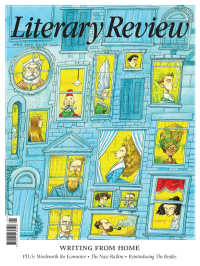Ewen A Cameron
A Tale of Two Referendums
Should Auld Acquaintance Be Forgot: The Great Mistake of Scottish Independence
By John Lloyd
Polity 214pp £20
The United Kingdom of Great Britain and Northern Ireland has never seemed so rickety. The combined effects of Brexit, to which 62 per cent of Scottish voters were opposed in the referendum of 2016, and the domination of Scottish politics by the Scottish National Party (SNP) are often pointed to as signals of its likely demise. In this lively book, the distinguished Scottish journalist John Lloyd argues that this would be an unnecessary mistake with tragic consequences for the United Kingdom. Lloyd is opposed to calls for independence and puzzled by their continued articulation: ‘Scotland, in the twenty-first century, is both as free and secure a nation as the world of the early twenty-first century allows. It would be worse than a mistake, a crime, to hazard that for an independence which can bring nothing better.’
The book is composed of the standard arguments against Scottish independence: that it would be economically risky; that the Scots have a good financial deal in the United Kingdom; that the underpinnings of Scottish nationalism, if not the SNP itself, are strongly anti-English; that a growing sense of Englishness, as a reaction to devolution, is much misunderstood. Lloyd was one of two hundred public figures to sign a letter to The Guardian in August 2014 arguing against Scottish independence. He draws great comfort from the fact that in the referendum on Scottish independence that took place the following month the proposition was defeated by 55 per cent to 45 per cent. Despite this, he is still worried.
The 2014 referendum was a strange affair. The Labour Party entered a tryst with the other unionist parties and continues to suffer the consequences. The SNP put forward an exceedingly weak case for independence and lost the campaign, but has profited in subsequent contests. The economic case for independence made

Sign Up to our newsletter
Receive free articles, highlights from the archive, news, details of prizes, and much more.@Lit_Review
Follow Literary Review on Twitter
Twitter Feed
It wasn’t until 1825 that Pepys’s diary became available for the first time. How it was eventually decrypted and published is a story of subterfuge and duplicity.
Kate Loveman tells the tale.
Kate Loveman - Publishing Pepys
Kate Loveman: Publishing Pepys
literaryreview.co.uk
Arthur Christopher Benson was a pillar of the Edwardian establishment. He was supremely well connected. As his newly published diaries reveal, he was also riotously indiscreet.
Piers Brendon compares Benson’s journals to others from the 20th century.
Piers Brendon - Land of Dopes & Tories
Piers Brendon: Land of Dopes & Tories - The Benson Diaries: Selections from the Diary of Arthur Christopher Benson by Eamon Duffy & Ronald Hyam (edd)
literaryreview.co.uk
Of the siblings Gwen and Augustus John, it is Augustus who has commanded most attention from collectors and connoisseurs.
Was he really the finer artist, asks Tanya Harrod, or is it time Gwen emerged from her brother’s shadow?
Tanya Harrod - Cut from the Same Canvas
Tanya Harrod: Cut from the Same Canvas - Artists, Siblings, Visionaries: The Lives and Loves of Gwen and Augustus John by Judith Mackrell
literaryreview.co.uk